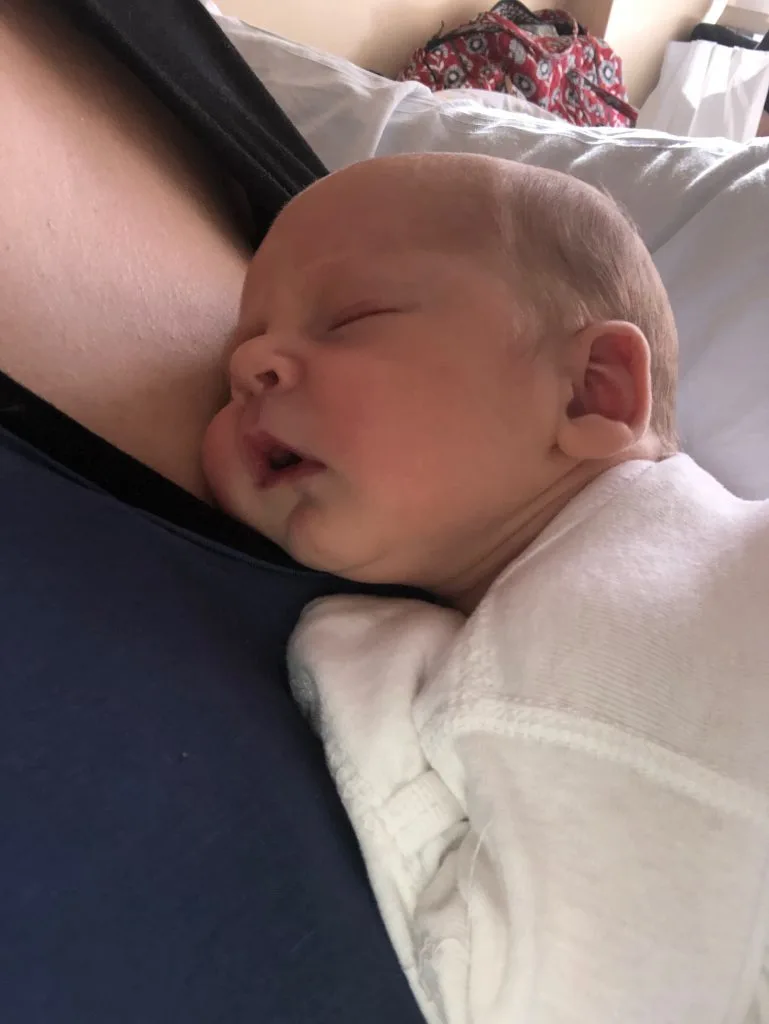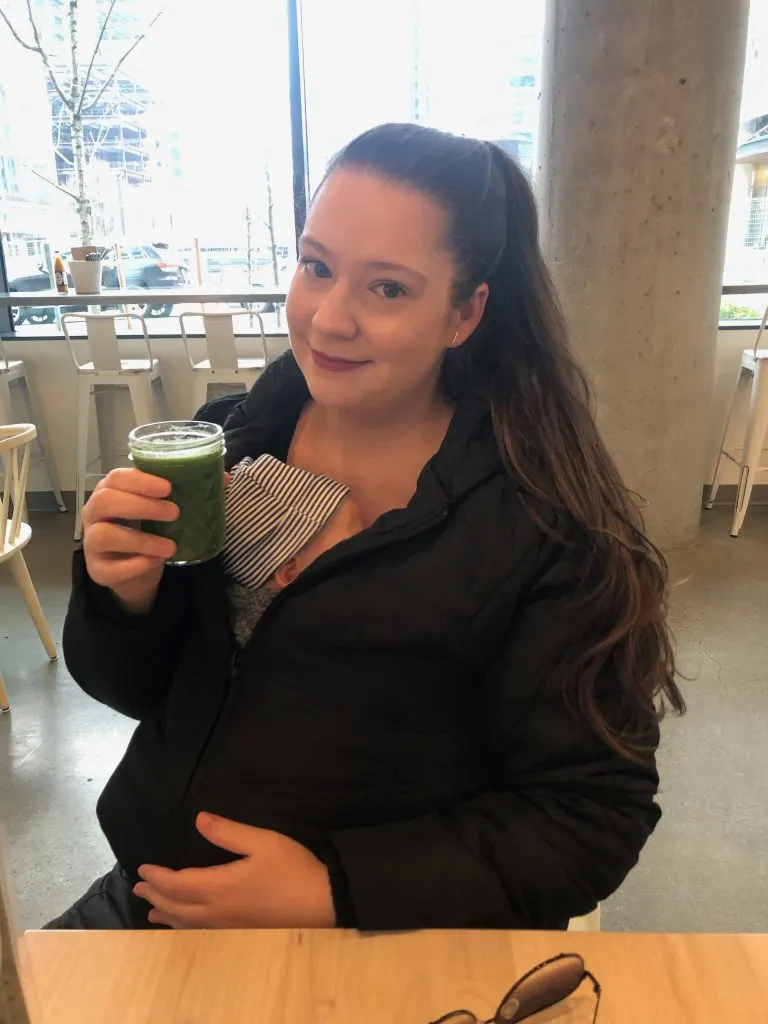
I want to start off this post by saying no matter how you choose to feed your baby, it’s hard. Whether you are nursing, exclusive pumping or bottle-feeding formula, providing nutrition to a newborn is exhausting.
No matter how you choose to feed your baby, you’re choosing the right thing. Fed is best.
It is completely your choice as parents to decide how to feed your baby. Whether you’re nursing, providing pumped breastmilk, using donor milk, opting for formula or supplementing breastmilk with formula, you are doing an amazing thing.
While some women choose exclusive pumping, many women stumble into it and figure it out as they go. There are many reasons women choose to exclusively pump, and just some of them are listed below.
If you’ve found yourself in any of these situations, know that it’s okay. You’re doing a great job, mama.
10 Reasons Why Women Choose Exclusive Pumping
1. The baby refuses to latch.
This is a very common reason women turn to exclusive pumping as a way to feed their babies. When your baby is refusing to latch, it can be emotionally and physically exhausting to try to continue to offer the breast only to end up with a screaming baby.
Some women force the baby back to their breast to overcome this. But many feel that it breeds a negative relationship and disrupts bonding. It’s up to you and your baby to interpret those feelings and that relationship.
You can discuss with a lactation consultant the best option for you if your baby is refusing to latch. There are different methods to help overcome latch refusal and some of them might work for you!
2. Work.
When women go back to work, they have to pump breastmilk to keep up their milk supply while they are away from their baby. Generally they are storing this milk for future feedings while their baby is in childcare.
Sometimes this becomes an easier routine to follow than switching back and forth between nursing and pumping.
3. Lip ties and/or tongue ties.
Lip ties and tongue ties prevent a baby from latching on to the breast properly causing poor feedings and often pain for the mother. They range from mild to severe and may cause many problems or may cause no problems.
There are a lot of other factors to consider. Including weight gain, time it takes to nurse, mother’s pain, etc when determining if a lip tie or tongue tie is causing issues with breastfeeding.
Ties can often be revised by professionals (and even pediatric dentists). If you as parents decide that it’s what you want to do for your child, you can.
4. They want to exclusively pump.
Yup, some women just want to! They have no desire to put the baby to the breast. I’ve heard a lot of women decide this in pregnancy and ultimately decide it’s the best choice for them.
Even still, they want to provide their babies with the nutritional and immunological benefits of breastmilk. And that’s okay.
5. Flow preference.
Some babies have a flow preference. Whether the mother’s milk flows faster or slower babies decide what they can and can’t manage.
I had an overactive letdown that my son struggled to manage at times because he was a slow eater. There are techniques that can help manage overactive letdowns, but none of them worked well for us.
It can also be easier for them to eat from the bottle if they are burning too many calories trying to nurse.
6. Anxiety.
Directly nursing can cause anxiety to rise for some women. It can be stressful to some not knowing how much milk their baby is drinking.
It can also cause a lot of anxiety in the postpartum period to be solely responsible for your baby’s nutrition. There are a lot of hormones moving throughout your body and if there are issues with feeding or other complications, nursing can be overwhelming.
It’s okay if you don’t like nursing. You don’t have to.
7. The baby is not gaining weight or is failure to thrive.
In some cases when the baby isn’t gaining weight, many women will turn to pumping in order to know how much milk their baby is drinking.
If your pediatrician is concerned about your child’s weight gain, it’s likely that they will suggest bottle feeding until the baby’s weight gain is back on the growth curve.
If this happens, women sometimes prefer just continuing to know how much milk their baby is getting so they continue to exclusively pump.
It can take a weight off of your shoulders to know exactly what your baby is eating.
8. Early birth.
When a baby is born early, nursing is sometimes an option, but often when a baby ends up in the NICU, there can be many health challenges that prevent a nursing relationship.
An early birth doesn’t necessarily mean feeding issues can arise but it is a reason women end up exclusively pumping.
9. Traumatic labor and delivery for mom and baby.
When a birth happens quickly and unexpectedly, there are a variety of issues that can arise.
Between fast hormonal changes, unexpected delivery choices, choices being taken away, mom or baby at risk, breastfeeding can end up on the backburner. And understandably so!
Women who find themselves in this situation might have to pump to help their milk come in, and then they just might not stop.
But please note that these things don’t have to keep you from trying to nurse! Every situation is different and there’s not always a straightforward answer.
10. The baby has blood sugar issues, reflux, etc.
There are many complications that babies can have that keep nursing from working out.
Some babies are born with blood sugar issues that require immediate intervention from health professionals. Some babies have reflux and need thickened feeds until they are able to overcome it.
If your baby is struggling to nurse and you still want to give them breastmilk, exclusive pumping is an option that is available to you!
Why I Exclusive Pump – My Firsthand Experience
To give you a better idea of how a woman might end up exclusively pumping breastmilk for their baby, I will share my story with you.
My son was born and latched right away, and what seemed like easily. His nursing sessions would take 30-45 minutes, sometimes up to an hour. That was exhausting after a 27 hour labor and me not having slept in almost 4 days.

It felt like he was nursing non-stop. Nearly every hour meant a new feeding session where we would then nurse for almost an hour. I was tired.
I was experiencing some pain, which I later found out was because he had a “chompy latch” from his lip and tongue ties. He would chop down on my nipple with his front gums instead of latching deeply. We tried a lot of tricks during our time in the hospital and it seemed to be improving. I felt like we were finding a groove and I was getting more confident.
My milk came in quickly, at two days postpartum I was engorged and had a clogged duct already, just to paint a picture. At this point, my breasts looked like bowling bowls and I almost couldn’t breathe from the weight of the milk. My letdown was hard for him to manage and he would pull back a lot to adjust the milk flow which left him frustrated.

Four days in I was developing blisters on my nipples and I knew something wasn’t right. I made an appointment with a lactation consultant. She suggested using a manual pump at first to reduce some pressure and to help create a softer area for a better latch. One pump of the pump sent two ounces of milk pouring out, even the lactation consultant was shocked! She said, “oh mama!” and I will never forget that reaction.
Seeing the damage on nipples, they said that my son had a pretty severe lip tie and a mild tongue tie. We decided to get them revised. She suggest I pump so my nipples could heal and so that I would not end up with tissue damage. That seemed reasonable to me. Honestly I was in a ton of pain at this point, and needed a break, however it came.
We couldn’t get an appointment to get his ties revised for a week. In the meantime I mostly pumped and still nursed him 2-3x a day.

He was a good sleeper from birth and was already sleeping 4-5 hour stretches at two weeks old. To help him develop good sleep habits, we gave him a bottle of pumped milk between his “night” time stretches of sleep. Doing this worked really well for us.
After having his ties revised, everything seemed to be back on the up and up. His latch was improving but we still struggled with the “chompy latch” at times. I don’t think nursing was a natural position for his mouth. He would push the nipple out and not create the negative vacuum needed for effective nursing so he would still take a while to nurse. Babies start to learn the sucking reflex at around 20 weeks in the womb. He had been learning “wrong” for a long time and I was attempting to reteach him. Sometimes he did well and other times he didn’t.
I nursed him 4-5x a day and I was pumping 2-3x a day to build a milk stash and to have milk for his night feeds. All felt well. Or at least, manageable.
Then came his 2 month shots.
After he got his vaccines at his two month appointment, he flat out refused to latch. He would rage scream whenever I offered him the breast. I didn’t know if he felt bad from the shots or if something else was wrong so we switched primarily to the bottle.
I continued to offer him the breast for several weeks and he refused nearly every time. Sometimes he would comfort nurse for 5-10 minutes but then he would stop and rage cry.
I’ve heard from several other moms that they’ve had this experience as well, though no one can really explain it.
I couldn’t stand to see my baby like that.
So I kept pumping.
The last time we tried to nurse, he was around 5.5 months old. He nursed for a few minutes and pulled away and that was that.
At this point, he was starting to get teeth (yikes). So I decided that would be the last time I would try. With the chompy latch we had struggled with previously, I was not risking a nipple to get him back to the breast.

Nursing didn’t work out for us, and I will always mourn that a little bit. But exclusive pumping was overall a great choice for us and I don’t regret it at all.

19 Things To Never Say To a New Mom - GenThirty
Tuesday 8th of June 2021
[…] This could make women who don’t produce enough breast milk very uncomfortable. Others simply don’t agree with the saying, “breast is beast.” Other moms enjoy the freedom of formula feeding. And even still, other moms choose to exclusively pump. […]
Kuleigh | Thistle Bee Blog
Thursday 6th of August 2020
We had a really similar story. My daughter was a really lazy feeder and by the time we got her to wake up enough to latch, she'd be at my breast for an hour. None of us were sleeping. Exclusively pumping was fine until she got a little older and I couldn't keep up with what she was eating. I felt tied to the wall! Feeding your baby is emotionally exhausting, period. Whatever method or combination of methods a mom chooses for her family is best! I wish I knew it didn't have to be all or nothing and that supplementing is OK too!
Nicole Booz
Wednesday 16th of September 2020
Yes, it's so challenging to feed a newborn no matter how you do it. Completely exhausting for awhile. And fed is best - 100%